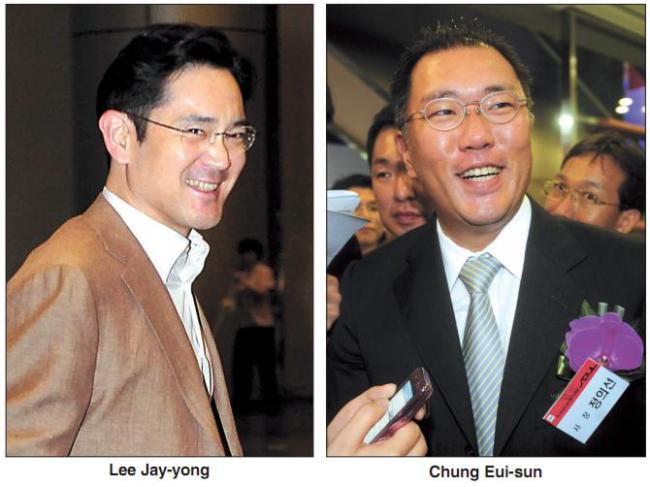Automaker officials foresee alliance after developing their own technologies
Chances are growing in the automotive industry that Hyundai Motor could eventually be backed by factories of Samsung Electronics for its car-oriented semiconductor business in about a year.
Officials of the two big companies have seemingly not ruled out the feasibility of their comprehensive partnership for what industry analysts call a lucrative car-semiconductor business.
Hyundai Motor executives appear to be more positive over the manufacturing alliance between the nation’s auto and chipmaker giants, respectively.
“As the first step, over the coming year or so, we will prioritize development of 100-percent unique technologies for the automobile semiconductor through our tech affiliate, Hyundai Autron,” a company executive said.
“Apart from holding technologies, another key issue is to secure the capacity of mass production,” he said. “It is undeniable that Samsung Electronics’ large-scale assembly lines are attractive to us.”

He predicted that Samsung Group may also be under internal discussion in forging a close alliance with the nation’s largest carmaker, stressing the car semiconductor sector has emerged as a future growth engine at home and abroad.
According to Hyundai Motor spokespeople, the automaker had to bear the burden of extremely high costs as it has heavily depended upon imports of car semiconductors from global auto parts makers including Germany-based Continental AG.
“These days, production of a passenger car requires about 200 semiconductors with state-of-the-art technology,” a spokesman said. “Those are estimated to account for more than 20 percent of producer prices of a vehicle on average.”
Data from the Korea Institute for Industrial Economics & Trade showed that Hyundai Motor and its affiliate Kia Motors have been importing automobile semiconductors totaling around 1 trillion won ($870 million) per annum.
A Samsung Electronics executive cited the current tie-up with Hyundai Motor in manufacturing car-oriented “sensors.”
Concerning the possibility of widening the scope of their partnership to car semiconductor production, he said it is not easy to forecast the future business at the present stage.
“It (mass production of car semiconductors for Hyundai and Kia) may be possible. We, however, believe it is entirely up to top-ranking decision-makers (including Samsung Electronics chief operating officer Lee Jay-yong),” he said.
Meanwhile, there is also speculation that Samsung Group is considering developing its car semiconductor business independently. Though the company is producing a certain amount of semiconductors for carmakers, those are not core auto parts.
The speculation is based on the conglomerate’s former automobile business, which is presently owned by France’s Renault Group as the brand of Renault Samsung Motors after the 1997 Asian financial crisis.
Some market observers downplayed the possibility.
“Automobile technologies are totally different from mass production according to drawings,” an auto industry analyst said.
He stressed that Hyundai has the technology and Samsung has mass production capacity amid growing global demand for high-end semiconductors for futuristic cars.
Saying that the world’s auto semiconductor market is projected to expand by 25 percent over the next three years ― from the 26 trillion won level in 2012 to 33 trillion won in 2015 ― the analyst said, “It seems that Samsung has little reason to reject the possible proposal from Hyundai.”
Aside from the scenario of Samsung Electronics offering assembly lines to Hyundai Motor, there is also a possibility that the memory chipmaker will seek a tie-up with foreign carmakers.
Exor, the parent firm of Italian carmaker Fiat, is poised to appoint Samsung Electronics COO Lee as its board’s independent director.
Local analysts predict that his connection with Exor could pave the way for Samsung Group’s tech subsidiaries to forge tie-ups with Exor’s automobile subsidiaries including Fiat and Chrysler in the car semiconductor or renewable batteries sectors.
Last month, Lee downplayed market rumors that Samsung Group may have big new plans for the automotive industry.
“(Samsung Group) will not carry out automobile business,” Lee told reporters.
For the research and development of car semiconductors, Hyundai Motor vice chairman Chung Eui-sun, the only son of Hyundai Motor Group chairman Chung Mong-koo, has taken the initiative.
Last April, Hyundai Motor Group completed the registration of a newly established electronic control systems company named Hyundai Autron, which will design electronic control software and semiconductors.
Hyundai Autron aims to secure its own technologies for designing automotive electric and electronic systems, non-memory semiconductors, software, electromagnetic controllers and telecommunication standardization.
Via coordination with affiliates like Hyundai Mobis and Kefico, the company is set to supply top-notch automotive electronic control systems.
The new Hyundai subsidiary plans to double its research and development staff from the current 200 to around 400 by the end of 2012 and to 500 next year.
It will also be in charge of professional training and consulting for employees in the area of electronic control systems.
By Kim Yon-se (
kys@heraldcorp.com)








